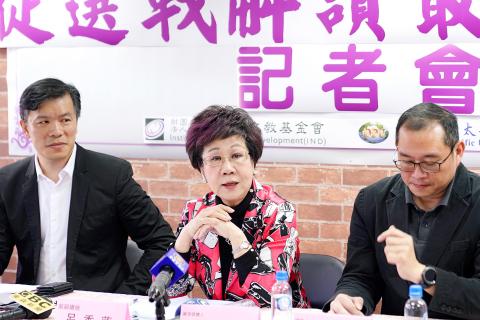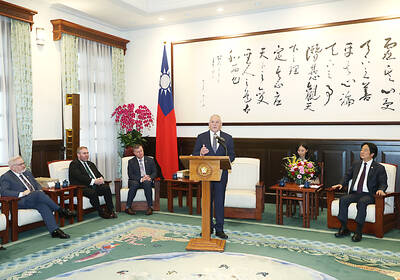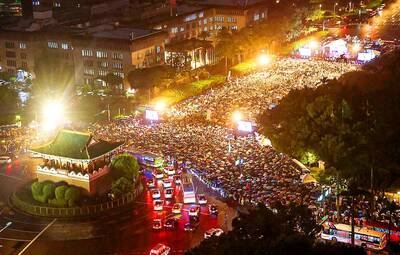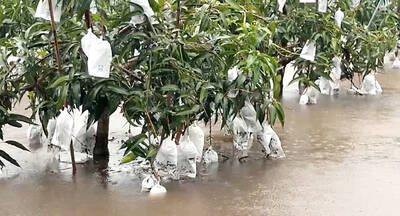Taiwan should become a permanently neutral nation as an alternative to either unification with China or independence, former vice president Annette Lu (呂秀蓮) said yesterday.
Chinese President Xi Jinping (習近平) on Wednesday in a speech said that Taiwan “must and will be” united with China based on the so-called “1992 consensus” and in accordance with the “one China” principle, and proposed a Taiwanese version of the “one country, two systems” model.
Lu, who left the Democratic Progressive Party (DPP) last year, said that there is no longer a “1992 consensus,” but only “one China, two systems (一中兩制).”

Photo: Huang Hsin-po, Taipei Times
The “1992 consensus,” a term former Mainland Affairs Council chairman Su Chi (蘇起) in 2006 admitted making up in 2000, refers to a tacit understanding between the Chinese Nationalist Party (KMT) and the Chinese government that both sides of the Strait acknowledge there is “one China,” with each side having its own interpretation of what “China” means.
Xi said he would not rule out the use of force, so the option of peaceful unification is also off the table, Lu said, adding that by the same token, maintaining the “status quo” is likely impossible and a new approach is needed.
Taiwan could only take three paths, she said.
First, it could accept China’s “one China, two systems,” in which China is the People’s Republic of China (PRC), she said.
Second, the nation could push for formal independence, whether as the Republic of China or as Taiwan, she said.
The third path is to become a permanently neutral nation, Lu said.
She said she would officially launch a referendum proposal on Feb. 27 to make Taiwan permanently neutral and would travel to the US in March to promote the idea.
Separately, on Saturday, Hong Kong democracy advocate Leung Kwok-hung (梁國雄) said that Hong Kongers’ rights have diminished since the adaption of “one country, two systems.”
Toward the end of 1984, China and the UK signed the Sino-British Joint Declaration on the question of Hong Kong, with annexes promising that Hong Kong would remain autonomous for 50 years, he said.
In 1990, the Chinese National People’s Congress (NPC) passed the Basic Law of the Hong Kong Special Administrative Region, the territory’s miniconstitution, he said.
However, the promises made to Hong Kongers in both documents have never been fulfilled, he said, adding that the situation has deteriorated instead.
To the Chinese Communist Party (CCP), “one country, two systems” means implementing two systems within one country, but the CCP’s sovereignty over Hong Kong is absolute and Hong Kong was never given the “high degree of autonomy” mandated by the Basic Law, he said.
In 2007, the NPC agreed that the chief executive of Hong Kong would be elected by universal suffrage in 2017, but in 2014, it rejected universal suffrage, he said.
The articles in the Basic Law that protect the public’s rights are constantly being amended, he added.
The right to interpret the Basic Law belongs to the NPC Standing Committee and its interpretation of the law can overturn the interpretation of the Hong Kong Court of Final Appeal, he said.
Hong Kong’s rule of law has become the rule of man, he said, urging Taiwan not to accept a “one country, two systems” arrangement.

‘NON-RED’: Taiwan and Ireland should work together to foster a values-driven, democratic economic system, leveraging their complementary industries, Lai said President William Lai (賴清德) yesterday expressed hopes for closer ties between Taiwan and Ireland, and that both countries could collaborate to create a values-driven, democracy-centered economic system. He made the remarks while meeting with an Irish cross-party parliamentary delegation visiting Taiwan. The delegation, led by John McGuinness, deputy speaker of the Irish house of representatives, known as the Dail, includes Irish lawmakers Malcolm Byrne, Barry Ward, Ken O’Flynn and Teresa Costello. McGuinness, who chairs the Ireland-Taiwan Parliamentary Friendship Association, is a friend of Taiwan, and under his leadership, the association’s influence has grown over the past few years, Lai said. Ireland is

A saleswoman, surnamed Chen (陳), earlier this month was handed an 18-month prison term for embezzling more than 2,000 pairs of shoes while working at a department store in Tainan. The Tainan District Court convicted Chen of embezzlement in a ruling on July 7, sentencing her to prison for illegally profiting NT$7.32 million (US$248,929) at the expense of her employer. Chen was also given the opportunity to reach a financial settlement, but she declined. Chen was responsible for the sales counter of Nike shoes at Tainan’s Shinkong Mitsukoshi Zhongshan branch, where she had been employed since October 2019. She had previously worked

FINAL COUNTDOWN: About 50,000 attended a pro-recall rally yesterday, while the KMT and the TPP plan to rally against the recall votes today Democracy activists, together with arts and education representatives, yesterday organized a motorcade, while thousands gathered on Ketagalan Boulevard in Taipei in the evening in support of tomorrow’s recall votes. Recall votes for 24 Chinese Nationalist Party (KMT) lawmakers and suspended Hsinchu City mayor Ann Kao (高虹安) are to be held tomorrow, while recall votes for seven other KMT lawmakers are scheduled for Aug. 23. The afternoon motorcade was led by the Spring Breeze Culture and Arts Foundation, the Tyzen Hsiao Foundation and the Friends of Lee Teng-hui Association, and was joined by delegates from the Taiwan Statebuilding Party and the Taiwan Solidarity

TRANSPORT DISRUPTION: More than 100 ferry services were suspended due to rough seas and strong winds, and eight domestic flights were canceled, the ministry said Tropical Storm Wipha intensified slightly yesterday as it passed closest to Taiwan, dumping more than 200mm of rain in Hualien and Taitung counties, the Central Weather Administration (CWA) said. As of 11am, Wipha was about 210km southwest of Cape Oluanpi (鵝鑾鼻) and was moving west-northwest at 27km per hour (kph). The storm carried maximum sustained winds of 101kph and gusts reaching 126kph, with a 150km radius of strong winds, CWA data showed. Wipha’s outer rainbands began sweeping across Taiwan early yesterday, delivering steady rainfall in the east and scattered showers in other regions, forecasters said. More heavy rain was expected, especially in the eastern